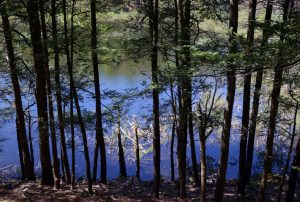LCT and SVT are working together to save the Edith and Paul Smith property
(excerpted from story in LCT’s Fall 2018 Newsletter)

Why is this land a high priority for acquisition?
Edith and Paul Smith amassed some 60 acres of magnificent land between Beaver Brook and Black Pond straddling Whitcomb Avenue. It includes scenic historic farm fields with barn, extensive granite stone works, wooded wetlands, marshland habitat along Beaver Brook, woodlands, healthy vernal pools, rich biodiversity, and a rugged ridgeline overlooking Black Pond.
The Smith’s accumulated extensive farm land and woodlands and gifted conservation restriction easements to the LCT. While protected from development, the land is not currently protected from private ownership — it could become a large private estate.
With the passing of Edith and Paul and the three adult children living on the West Coast, it is time to acquire, permanently protect, and professionally manage this treasured landscape through collaborative efforts.
Why is this landscape significant?
The Beaver Brook wooded marshland provides habitat for threatened species including turtles and salamanders and protects and replenishes the downstream Whitcomb Drinking Water Wells. It is situated in the midst of a mosaic of adjacent protected conservation lands – Harvard Conservation Commission land to the west, Littleton Conservation Commission land to the north, and Littleton Conservation Trust lands to the south and east. The Smith land allows roaming corridors for black bear, bobcat, deer, fox, coyote, deer, fisher, and turkey as well as through-hiking on interconnected trails.
The land will provide passive recreation for snowshoeing, cross- country skiing, wildlife-watching, and quiet outdoor enjoyment. Additionally there is potential to return the southwesterly grazing lands back to small lot farming overlooking the scenic Beaver Brook marshland.
Why so Little Cost for so Much Public Benefit?
The antique homestead and aging barn have been sold off thereby eliminating building maintenance costs. The remaining conservation land is being sold for public benefit at a significant discount. The Harvard Conservation Commission will buy the 13 acres in Harvard, leaving 47 Littleton acres, nestled in the midst of adjacent and protected public access conservation lands, still to be purchased. SVT is hard at work raising $150,000 from grants and foundations, leaving just $35,000 (about $745 per acre) to be raised by individuals through crowdfunding contributions, spanning both small and large donations. LCT and SVT are collaborating and encouraging contributions from all. Contributions for SVT’s purchase can be made either directly to LCT (with memo for Smith Property) or to SVT through its online crowdfunding application: www.mightycause.com/story/Z4cauf
SVT will acquire the Smith Property, make public access accommodations, and professionally manage the natural resources as the new conservation land owner. LCT will continue as Conservation Restriction/Easement holder for the full 60 acre Smith Property, even as the land ownership changes, and will collabo-rate with SVT in the property’s conservation management.
Who is SVT and How is SVT Helping Littleton?
SVT’s name is confusing since it has evolved into a staffed, regional land trust serving all 34 towns within the SuAsCo Watershed. The eastern portion of Littleton lies within the Assabet River drainage area so all of Littleton is served by SVT. LCT has invited SVT to acquire the Smith Property as the conservation owner and to work together with LCT as the Conservation Restriction/Easement (CR) holder, given SVT’s successful track record. SVT wrote the $500,000 grant for Littleton to purchase the George and Lucy Yapp Conservation Property and now serves as that property’s CR holder. Additionally, SVT exercising a Right of First Refusal (ROFR), secured the Herget CR easement for public access from Foster Street to the Town Forest. SVT has collaborated with many surrounding communities in raising funds for acquiring farmland and conservation lands.
